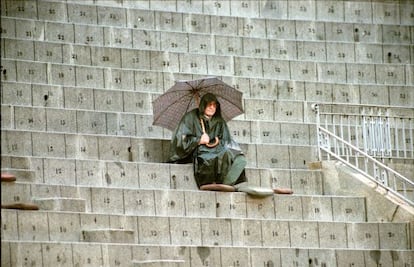A cup of cold coffee and a cigarette
Ten years ago this month, Joaquín Vidal, one of the last of the old-school bullfighting critics, passed away at the age of 66. One of Spain's most respected writers on the subject, he spent his career at EL PAÍS, penning thousands of reviews for the newspaper until he retired through ill-health in September 2001

Vidal's death was a blow to those who, whether they were aficionados or not, looked forward each morning to reading the master's review, hoping to learn a little more from his observations and judgment, while at the same time savoring his unique style and enjoying his subtle, intelligent humor.
He was a man of simple tastes - he liked nothing better than to sit round the table with his friends discussing bullfighting, sipping on a cup of cold, strong, black coffee, which was always accompanied by a dark tobacco cigarette. He was a man of strong, well-argued opinions about bullfighting, and believed that the purity of the event had been undermined by commercial interests.
As he talked, and made his points, he seemed so serious, but perhaps it was shyness that made him look so stern, so dry, at times. He was a man who loved bullfighting, who was passionate about it. A man who demanded the utmost from the bull and the fighter. But above all, he was a great man; a journalist; a decent man.
Joaquín will no longer take his seat at Madrid's Plaza de Las Ventas, where he was immortalized by photographer Claudio Álvarez one rainy afternoon in 1999, alone, protected by a green waterproof mac and umbrella. At the end of each of the corridas during the April bullfights in Seville's annual fair, he would leave the ring and scurry over to a nearby filling station where he would type out his first reports, and then start up his battered Mercedes and head over to the newsroom, by now late into the evening, where he would correct and edit his story, making it in time for the first edition.
Adiós to his seat in La Maestranza, where, strangely enough, Joaquín never saw a bullfight to the end. The demands of the printing press, before the cellphone and the laptop, meant that even if the fifth bull of the afternoon had not yet been dispatched, he would have to leave his place, hurrying to meet his deadline.
Adiós to Valencia, to Pamplona, to San Sebastián, to Bilbao, Zaragoza, Guadalajara, Arganda del Rey, Cenicientos, San Sebastián de los Reyes, Zaragoza, and countless other bullrings that he would visit each season.
Joaquín asked me to give you the pen he used to write so many of his stories"
The day after he died, EL PAÍS published a piece by his friend Miguel Mora, in which, perhaps carried away by his feelings, he said that Joaquín's stories were characterized by his honesty - an honesty that often earned him the enmity of some in the bullfighting world, as well as by their irony and light touch, but above all by his determination to uncover the corruption that he believed had sullied the deeper truth that lies beneath the event.
A few months later, publishers Aguilar put together a book of Joaquín's finest stories. Juan Luis Cebrián, the founding editor of EL PAÍS, described Joaquín in the book's introduction as "somebody who revived Spanish prose, somebody unique, but who deserved to be imitated, journalistically honest, and of literary fiber."
Juan Antonio Arévalo, the former Socialist Party senator, said: "Vidal's articles were authentic works of art in which a deep knowledge of the reality of bullfighting blended with a wonderful prose style that was punctuated by subtlety, humor, and keen observation."
Subsequently, Madrid's main bullfighting association, El Toro, successfully lobbied for a plaque to be placed at the entrance to the area in Las Ventas bullring where Joaquín always sat. It read: "From this stand, journalist Joaquín Vidal exercised the mastery of his profession. From a grateful public. April 2003."
The association also brought out a collection of some of his more memorable pieces.
A few days after the death of the master, I had a cup of coffee with his widow, Pilar, who is, sadly, no longer with us.
It's been 10 years, and the space he left behind has still not been filled
"Joaquín asked me to give you this ballpoint pen, the one that he used to write so many of his stories," she told me.
It's been 10 years, and the space he left has still not been filled. Perhaps the best homage we could pay to Joaquín is to say that his legacy remains at EL PAÍS: we continue to write about bullfighting - not with his ballpoint pen, out of respect, and not with anything like the skill and mastery he displayed, but in continued search of the purity and honesty of the fiesta.
Tu suscripción se está usando en otro dispositivo
¿Quieres añadir otro usuario a tu suscripción?
Si continúas leyendo en este dispositivo, no se podrá leer en el otro.
FlechaTu suscripción se está usando en otro dispositivo y solo puedes acceder a EL PAÍS desde un dispositivo a la vez.
Si quieres compartir tu cuenta, cambia tu suscripción a la modalidad Premium, así podrás añadir otro usuario. Cada uno accederá con su propia cuenta de email, lo que os permitirá personalizar vuestra experiencia en EL PAÍS.
¿Tienes una suscripción de empresa? Accede aquí para contratar más cuentas.
En el caso de no saber quién está usando tu cuenta, te recomendamos cambiar tu contraseña aquí.
Si decides continuar compartiendo tu cuenta, este mensaje se mostrará en tu dispositivo y en el de la otra persona que está usando tu cuenta de forma indefinida, afectando a tu experiencia de lectura. Puedes consultar aquí los términos y condiciones de la suscripción digital.









































